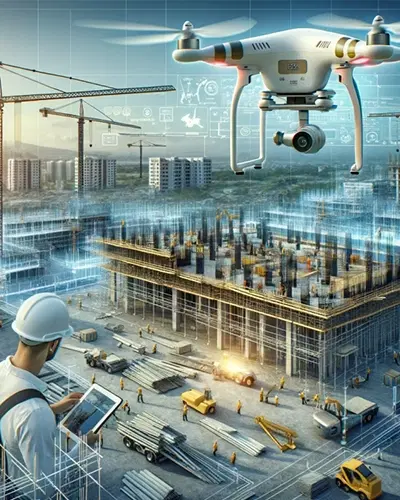The Internet of Things (IoT) is revolutionizing the construction industry by providing a range of tools and services that can help streamline the process and make it more efficient. With IoT, construction companies can access real-time data from their projects, allowing them to better manage resources, monitor progress and identify potential problems quickly.
Additionally, IoT devices can be used to automate processes such as scheduling, inventory management, and safety checks. This helps reduce costs and improve productivity. As a result, IoT is becoming an integral part of modern construction in Dubai.
It has been noted that construction companies in Dubai are using technologies related to the internet of things (IoT) and depending on them to improve data gathering and sharing. This has led to an improvement in their effectiveness as well as management of time and expense overruns.
Benefits of using technology in construction: improved efficiency, accuracy, and cost savings
Reduces Project Uncertainties
Advanced technology in construction can help reduce risks associated with construction projects. For example, it can be used to detect potential safety hazards in a timely manner so that preventive measures can be taken before any accidents occur.
Furthermore, it can also be used to monitor resources and materials needed for a project in order to ensure that there are no delays due to a lack of supplies or equipment. It has helped reduce project uncertainties in construction by providing accurate data and insights into the progress of projects as well as identifying potential risks before they become an issue.
Contributes To Improved Building Quality
Advanced technology has made it possible for builders to create safer and more durable structures than ever before. From 3D printing to automated robots, modern building techniques are improving the quality of construction work while also making it easier for builders to meet deadlines. With these advancements in technology, it is clear that building quality will continue to improve in the future as new technologies become available.
Improves Relationships With Customers
Advanced technology makes it quite efficient to complete a project with better quality within the proper time period. This directly impacts the impression of clients. If you deliver work efficiently, it will automatically enhance the trust and satisfaction of your client which will improve the relationship.
Elevates Cost Savings
Advanced technology also helps to reduce costs associated with construction projects by streamlining the process, reducing labor costs, and eliminating waste. This is especially important in large-scale projects where time is of the essence. In addition, advanced technology can help to ensure that buildings are constructed according to strict standards and regulations.
Helps To Decrease Labour Shortage Hurdles
In the construction industry, the labor shortage has been a major hurdle in completing projects on time. However, with the help of advanced technology, this problem can now be addressed more quickly and efficiently. By utilizing robotics and automation, construction companies can reduce their reliance on manual labor and increase their productivity.
Additionally, AI-driven solutions such as predictive analytics help to identify potential bottlenecks in the project and suggest solutions for them. This helps to reduce labor shortages by allowing companies to better plan their resources and manage their workloads more effectively.













